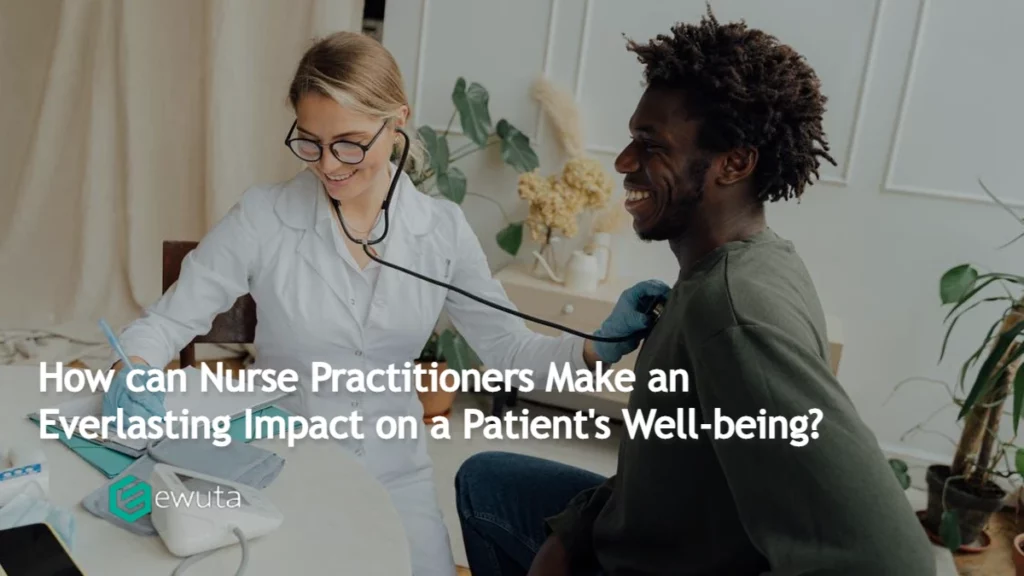
Nurses empower and uplift their patients, helping them navigate complex illnesses and manage debilitating pain to enjoy life quality. They work day and night tirelessly, dedicating themselves to maintaining the highest patient care and safety standards.
Nurses cannot afford to make the slightest mistakes as errors risk compromising patient safety and well-being.
The pressure to maintain accuracy and efficiency in highly stressful healthcare situations can take a toll on a nurse’s health. Practitioners tackle overwhelming bouts of occupational stress stemming from their chaotic work environments and inflexible shift schedules. But despite these challenges, nurses never fail to build personal connections and treat their patients with compassion.
Unlike other practitioners, nurses combine primary care with empathy and cultural sensitivity. They take time to understand the patient’s cultural perspectives and tailor treatments to ensure adherence and participation.
How can nurse practitioners improve patient care and make an everlasting impact on their well-being?
Keep reading to find out!
Pursuing Higher Education & Clinical Expertise
Nurses who don’t prioritize higher education and academic advancement remain stagnant within entry-level roles and administrative positions. Practitioners who aim for clinical participation and authority must invest in their education and skill-building. Healthcare environments are exceedingly challenging and demanding, and senior medical professionals routinely undermine nurse practitioners.
Practitioners can accelerate career advancement by pursuing higher education and developing clinical core competencies. The journey begins with a BSN program, uplifting skill sets with advanced clinical and primary care expertise. However, a nurse’s career takes flight with an MSN specialization, building clinical authority and advanced skills.
Suppose you want to escape chaotic healthcare environments and inflexible schedules with a rewarding career in primary care. In that case, consider pursuing an online MSN FNP degree to develop your skills as a primary care practitioner. Combining a full-time degree with a hectic BSN schedule isn’t easy, but e-learning platforms offer accessibility.
An online degree program from an accredited nursing institution will bring you closer to actualizing your dreams of a rewarding nursing career. However, time management and self-discipline are of the essence to manage your academic coursework and professional obligations seamlessly. It will get overwhelming and demanding, but keep yourself motivated by focusing on the advantages of the FNP pathway.
FNPs enjoy clinical authority, professional esteem, flexible 9-5 work schedules, high-paying opportunities, and control over treatment design. They treat patients of all ages diagnosed with multiple illnesses and medical conditions, often referring them to specialists for advanced care. FNPs are entrusted with the well-being of individuals, families, and communities, and this role demands active community involvement.
Humanize Patient Care & Interactions
It’s common for nurses to refer to patients using room numbers, ward numbers, and other non-personal references. Such practices are exceedingly common and often encouraged by healthcare administration to maintain decorum and professional barriers between patients and practitioners. However, nurse leaders strongly advise against dehumanizing patients by referring them with non-personal references.
Nurse practitioners can have an everlasting impact on their patients by infusing clinical care with the human touch. Humanizing patient care and interactions by building personal connections can promote positive treatment outcomes by motivating patients to adhere to the treatment. The idea is to form personal relationships with patients by learning their names, life stories, struggles, and inspirations.
Nurses are advised to spend time with patients and schedule one-on-one interactions whenever they can manage. Patients languishing in the isolation of their hospital rooms crave social interactions and appreciate nurses taking out time to sit with them. Building intimate relationships allow nurses to influence and motivate patients, encouraging them to comply with medications and treatment.
Empowering Patients towards Self-Care
Nurses carry the mammoth responsibility of reducing the overall burden of diseases on the healthcare facilities they serve. This endeavor demands promoting speed recoveries and reducing the risk of rehospitalization for discharged patients. Practitioners must empower patients with awareness and education, encouraging them toward self-care.
The goal is to ensure the patient adheres to the treatment and preventive care regime to enjoy a healthy lifestyle after being discharged. However, achieving this goal isn’t as easy as it may seem. In most cases, nurses struggle to take patients on board with preventive care and lifestyle management. Most patients commit to change without actually adhering to the practitioner’s advice and committing to impactful lifestyle changes.
They work closely with patients and family members to change damaging perceptions and promote wellness-focused mindsets. Practitioners help patients realize the life implications of chronic symptoms and design preventive care regimes to ensure positive health outcomes.
They plan dietary interventions, design physical fitness regimes, and map out lifestyle interventions to help patients heal and recover.
Nurses collaborate with practitioners like nutritionists, dieticians, and physical therapists to ensure their patients access quality care.
Healing Emotional Trauma & Restoring Mental Well-being
Nurses operate in numerous settings, including clinical and psychiatric care to help patients reclaim their life quality and independence. Regardless of their work environments, nurses must regulate the patient’s emotional and mental well-being to ensure positive treatment outcomes. Stress, anxiety, and depression aggravate chronic illnesses by riddling the body with stressful and destructive hormones, like cortisol.
Chronic illnesses like type 2 diabetes or cancer accompany severe bouts of overwhelming pain, emotional distress, and mental challenges.
The trauma of chronic pain, loss of independence, compromised mobility, and debilitating treatments can get too overwhelming. Patients struggle with numerous issues, such as low self-esteem, despair, hopelessness, chronic stress, and anxiety.
Nurses must extend compassion and empathy toward patients and help them develop coping mechanisms to restore mental well-being. Many family members and caregivers watching their loved ones fighting terminal illnesses also need the compassionate support of nurses.
Final Thoughts
Nurses touch their patients with kindness and empathy, respecting their cultural sensitivities and empowering them with self-care mindsets. They go above and beyond to ensure patient safety and deliver quality care. Ambitious and passionate nurse practitioners invest in higher education and skill-building pursuits to provide the best care standards.
Practitioners can make an everlasting impact by shifting patient attitudes regarding health, nutrition, physical fitness, and disease prevention. It’s crucial to help patients alter damaging perspectives that encourage them to indulge in reckless behaviors, like smoking and substance use. Nurses can reduce the global burden of diseases by empowering patients with tools to look after themselves.



